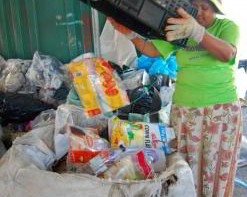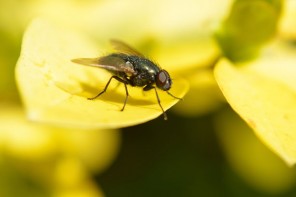Garikai Samaita, 36, from Goto village in rural Wedza, about 100km southwest of the Zimbabwean capital Harare, has discovered how to take the sting out of bees and use them to sweeten his life.
In September 2011 a bee colony settled in a tree near his homestead and became a nuisance, even stinging his eight-year-old son. This prompted Samaita to try to smoke them off his property.
However, by coincidence an agricultural extension worker was visiting a relative in the village and discouraged him, advising him rather to approach international NGO Environment Africa (EA) for advice on honey production.
So began an income-earning bee-keeping project.
Samaita is one of several thousand people benefiting from EA’s programme, which aims to boost rural incomes for vulnerable households through the sustainable exploitation of the environment.
Bees are our friends
Bees play a critical role in the balancing of the ecosystem and, as agents of pollination, increase production of crops, fruits, seeds and vegetables. Their honey is also highly nutritious.
“Bees used to scare me very much, especially after a friend of mine was stung to death by a swarm when I was growing up. We always lit huge fires underneath trees to drive them away, but the bees are useful friends now,” Samaita told Irin.
Since embarking on his beekeeping, or apiculture, enterprise with two hives about nine months ago, Samaita’s honey yield has tripled from the regular harvesting of six beehives kept in a nearby forest.
“I am now managing to get by and have enough money to look after my family, unlike in the past when we used to struggle,” he said. “Here in Wedza, harvests have been poor for a number of years because of drought, but I am one of the few in this area who have enough food in the house.”.
According to USAID’s famine early warning systems, southern Zimbabwe has been badly affected by drought, and national cereal production for the 2011-2012 season is estimated at 1.1-million tons. This is a third lower than the previous harvest, and only about half of the annual national cereal requirement of about two million tons.
The US$80 (R681) or so a week generated from honey sales along the highway and from customers in Harare is sufficient to buy food for Samaita’s family, pay the educational costs for his two school going children, and cover the costs of his ailing mother’s medication and hospital fees.
Samaita takes his honeycombs to a community-owned processing plant at the nearby Wedza growth point, where EA assists in refining the produce and packaging the honey for sale.
The EA initiative began in early 2011 and is currently benefiting about 5 000 poor and vulnerable rural families in 23 of the country’s 59 districts.
Adding value
Some beneficiaries have creatively begun to add value to their apiculture through diversification, which does not detract from honey production. They’re selling beeswax, used mostly in candle-making, woodwork lubricants and wood preservation.
Other revenue possibilities from beeswax include hair care products, such as shampoos and hair wax, as well as soap.
The scope for other value-added products includes propolis – which has medical applications – royal jelly, a honey bee secretion specifically used for the nutrition of queen bee larvae and in demand by the cosmetic industry, and bee venom or apitoxin, a colourless liquid with anticoagulant and anti-inflammatory properties.
On average, a beekeeper can produce about 60kg of honey per hive in a year, Barney Mawire, EA’s country manager, told Irin. The producer earns about US$10 (R85) a kilogram, which makes it “a potentially lucrative business for those that are involved in it”.
Changing lives
Nellia Goromonzi, 40, a widow from Zvimba District about 90km northwest of Harare, has bought three head of cattle using the proceeds from her EA beekeeping enterprise.
“My life has changed so fast. We sold all our cattle to meet medical expenses when my husband died four years ago and I never dreamt of owning livestock again. I no longer have problems sending my three children to school and I have joined three other beneficiaries so that we may start a beer selling business,” she told Irin.
Goromonzi employs her cousin to hawk some of her honey produce along the road, and supplies shops in the nearby Murombedzi business centre in rural Zvimba in Mashonaland West province. She also receives orders from businesses in the nearby farming town of Chinhoyi.
Economist John Robertson told Irin: “Beekeeping can indeed be employed to change the lives of people. Beneficiaries can generate enough money to fight hunger, buy assets and send their children to school or foot health bills.”
Robertson added that strategies by stakeholders and the government, which will ensure the initiative is sustainable, are crucial for success.










